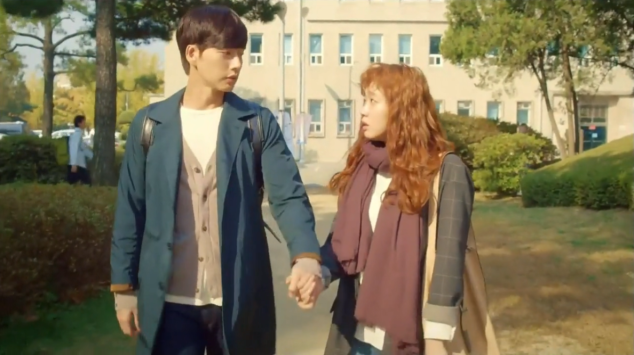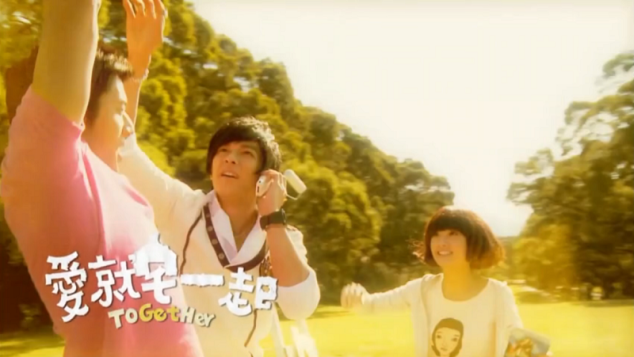On the lush grounds of frizzy-haired college girl Hong Seol’s campus roams a bunch of green-eyed beings—stalkers, thieves and one copycat—accusing one another of being weirdos who think of normals like themselves as weirdos. There is also the Mr. Nice, Yoo Jung, whom Seol catches betraying a faint smirk when a flirtatious schoolmate trying to strike up a relationship with him at a party “accidentally” has beer poured over herself. Jung, in turn, catches Seol catching on to his trick and stares back. Such is the chilling tone of the lead couple’s first encounter in 2016 Korean drama Cheese in the Trap. In the time to come, Seol suspects Jung of more misdeeds, while he subtly maneuvers people into harassing her—or at least she thinks. One year later, though, Jung starts acting friendly to Seol too and pestering her to have lunch together. At first flustered, Seol discovers the real culprit behind a misdeed and acquiesces out of guilt, only for him to propose that they date not long after that. But the audience gets to see the incident from the culprit’s perspective and find out that Jung is the puppet master after all. Just what is Jung scheming now?
The Dark Sides of Education
Kazuo Ishiguro is no Michael Crichton. Lying at the heart of his dystopian world in the novel Never Let Me Go, where human clones are raised as organ donors, is not futuristic speculation about biotechnology, but a metaphor for how awareness of the finitude of life influences ordinary people’s treatment of love and friendship. What also intrigues him are the stories we manufacture and share among ourselves to come to terms with mortality and accept our fate. Hauntingly, some of these stories and storytelling habits, together with constraints on human potential, may be propagated right in our education machines.
Lost Heroines
In a quaint alleyway in the heart of Seoul, a scarred, reticent chef known only as “Master” operates a low-key eatery from midnight to seven in the morning. The menu has just one modest dish, but patrons are free to order whatever they want. Night after night, various sorts of workers drop by and share their woes and joys over the hearty dishes, while Master looks on with a small smile from the kitchen, rarely interjecting a remark except to serve food.
One regular, a down-and-out musician, has this ritual of burying a chunk of butter under white rice, letting it simmer for half a minute there while he sits back contentedly with folded arms, lightly adding a few dashes of soy sauce after that, and then mixing everything together. Looking on in admiration, the other patrons would imitate him and this small place in 2015 Korean drama Midnight Diner, adapted from a Japanese comic series of the same name, becomes a cocoon of simple bliss. In lieu of cash, Master permits the musician to repay him with a guitar performance, bringing more cheer to everyone. These happenings make them momentarily overlook a haughty food critic invited to the eatery one night.
The twist you are waiting for is this: the crowd-pleaser in the room and the most irksome man there are Continue reading
Icing on the Bytes
If you believe you have graduated from Korean dramas of the early 2000s or take pride in never having been part of the fandom, you would probably shrivel in mortification at yourself in the event you fall for the following tropes in 2013 web series Wind Chimes in a Bakery: cancer, amnesia and parental opposition to courtship. Few, though, would consider the symbolism of love through wind chimes a banal storytelling device.
Weaving Poetry, Beauty and Meaning

Huang Juxiang (lit. fragrance of yellow chrysanthemums), Yamamoto Yueniang’s Peranakan mother and look-alike
Enveloped in a mesmerizing atmosphere with a light touch of folk magic, Southeast Asian drama The Little Nyonya traces the story of its fairylike, Japanese-Peranakan heroine Yamamoto Yueniang from the 1930s to the present day. Its origins, however, began much earlier. Since the 10th century, millions of people from the southern coasts of China had been migrating to the Malay Archipelago, most of them seeking economic opportunities and better living conditions. However, these migrants were largely male as travel restrictions, financial constraints and lack of feminine independence in the patriarchal Chinese society discouraged women from joining the men for a long time. As a result, many early male migrants married local women and their offspring came to be known as Peranakan, a Malay and Indonesian word for locally born people of mixed Malay and foreign ancestry, or Baba-Nyonya. A term with Persian and Hindi-Urdu roots, baba refers to a male Peranakan Chinese (there are also Peranakans of Indian and Portuguese descent), whereas nyonya, a combination of a Chinese dialect word for young lady (nyo) and a Javanese word for madame or concubine (nyai), is the female equivalent.
A Headful of Mountain Flowers
The most boorish and mercenary character in Hong Kong drama War and Beauty is also its greatest romantic.
Eager to leave poverty behind and make a name for himself in the dog-eat-cat world of 19th-century Qing China, delivery agent Kong Wu has no qualms leaving a group of defenseless girls to the mercy of ruthless thugs so that he can complete his job. Yet when he discovers a silk handkerchief embroidered with a poem inside a second-hand battle garment possibly donated by the palace, he develops feelings for its creator even though he does not know her. Continue reading
Simoleon Physiology
1.
“Metaphors are powerful. No matter how subtle and sophisticated we would like to believe we are in our thinking, basic visual or tactile images create the very foundations of our thought. Compared to clockwork images of economies, the metaphor of ‘the economy as a beating heart’ seems to be particularly apt. The heart has a particular physical structure (valves and chambers) and regularity of functioning. Imagining the economy as a heart recognizes that it also has structures (institutions) and regularities, which is not different from imagining it as a machine. But because the heart is a living, vital organ, additional highly relevant insights flow from this metaphor.
Jordanian Inspiration, Joseon Incarnation
誰斷崑山玉 수단곤산옥
裁成織女梳 재성직녀소
牽牛離別後 견우이별후
謾擲壁空虛 만척벽공허
Translation:
Half Moon Poem – Hwang Jin-yi (Joseon poet and gisaeng)
Who broke off jade from the mythical Kunlun mountains
and fashioned it into a comb for the weaver fairy?
After she and her cowherd lover separated,
it was thrown haphazardly on the blue sky.
It is not unusual to depict scenery through fashion. Clones of T-shirts emblazoned with images of palm-tree-dotted beaches or New York streetscapes have plagued subways and malls, after all. Even among high-end fashion labels, there are the Chanel hemline comprising of glittering motifs of the Dubai skyline, Christian Siriano’s evocation of ethereal vistas of sand and water through his pastel–hued prints, Jason Wu’s reproduction of the starry heavens on his diaphanous gown, and more. Jordanian architect and fashion illustrator Shamekh Al-Bluwi, in contrast, is the rare breed who unimaginably accomplishes the reverse.
Necessity and Sufficiency
Even the most fervent critic of metaphysics must have pondered from time to time: what is the meaning of my existence to this world?
Feeling hopeless about her prospects in grades-obsessed South Korea on the day of the college entrance examination, mathematically challenged highschooler Jang Dan-bi jumps into a rain puddle transporting her to a drought-stricken Joseon, where Sejong the Great (King Sejong) and his ministers are praying for a timely, much-needed rain, also called “danbi” in Korean. Now in the 15th century, when modern multiplication tables are unheard of, her mediocre mathematics skills take on heightened importance as she teaches mathematics enthusiast King Sejong rudimentary arithmetic and science. Along the way, she befriends a man she identifies as Jang Yeong-sil, an actual historical figure credited for the invention of multiple meteorological and astronomical devices, and inadvertently takes the audience on a whirlwind tour of Joseon technological advances.
But the message Splish Splash Love conveyed to high school seniors, who received their examination results the week before the first broadcast, went deeper than that. Continue reading
Tagorean Victory
If Taiwanese drama ToGetHer could be compared to a dish, it would likely be a hearty cheese and tomato sandwich topped with a soft and silky sunny-side up egg—nothing profound or elegant, but enviably more efficient than a typical philosophical tome at brightening up a wintry morning. All the same, this is not an ordinary sandwich, but one which yolk carries a small dash of the flavor of the sublime sun worshiped by the silence of a tiny flower’s purity under Bengali poet Rabindranath Tagore’s pen.









You must be logged in to post a comment.